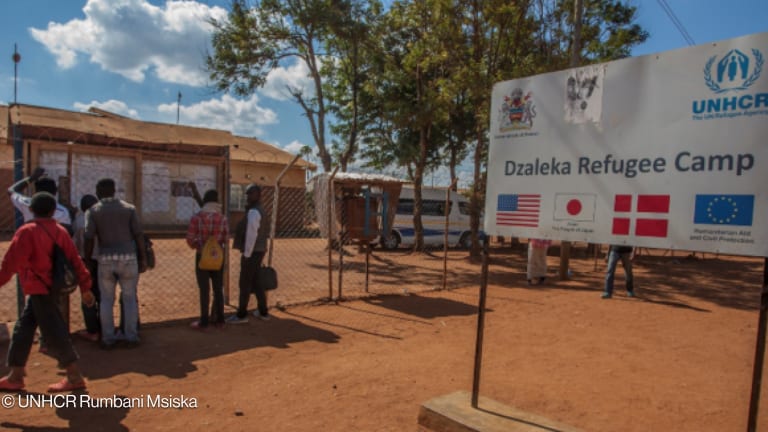
Colombian President Iván Duque said his “bold” plan to grant temporary legal status to Venezuelan refugees and migrants in his country “was the right thing to do” despite the political challenge of giving them greater access to state resources as the country struggles with the economic fallout of the COVID-19 pandemic.
Announced earlier this month, the status provides Venezuelan refugees and migrants 10-year permits that will give them legal access to the labor market, education, and health care systems, as well as other government services. Previously, about half of Venezuelans in Colombia had legal permits that required renewal on a monthly basis, while the other half were not regularized.
“Those people are already in Colombia, and they have also suffered from the pandemic,” Duque said. “We decided, even though we’re not a rich country — taking [in] 1.8 million people to have this kind of access to opportunities obviously brings a cost — but we’re already paying a lot of that cost. So let’s be sincere, let’s be bold, humanitarian, and fraternal.”
Regularizing the additional Venezuelan refugee and migration population will better allow the Colombian government to provide services because the documentation will generate data and allow for biometric tracking.
“The other 900,000 people, we just don’t know where they are. We don't know where they live, we don’t know their names, we don’t know their socioeconomic conditions, we don’t know their health conditions, and that means that they are invisible,” Duque said. “That invisibility drives abuses. … They don’t have the capacity to open a bank account.”
“This is the world’s most worrying humanitarian crisis and migration crisis at the same time that we’re facing. It has surpassed Syria.”
— Colombian President Iván DuqueDuque said the policy was a practical recognition of the reality that many Venezuelans will likely not be able to return home anytime soon, and lengthening their legalization to 10 years will allow them to be the most productive members of Colombian society possible. It will also allow those in certain professions, such as lawyers and doctors, to be able to practice legally in Colombia.
The cost of serving the population must be shared by the international community, Duque said. He called for a higher commitment to actually disbursing pledged money from international donors, noting that the regional crisis remains underfunded and that pledged money sometimes never arrives. The 2020 Regional Refugee and Migrant Response Plan still remains only 41.7% funded, while the 2021 plan has received just 2% of the required $1.44 billion.
“We need to mobilize resources, and those resources are not for us. They are not for Colombia. They are for those families in need,” Duque said. “We need to raise [our] voice to understand that this is the world’s most worrying humanitarian crisis and migration crisis at the same time that we’re facing. It has surpassed Syria.”
Duque also endorsed a capital increase for the World Bank, sought by Inter-American Development Bank President Mauricio Claver-Carone. The Colombian president said the bank needed more capacity to provide resources to Latin America and the Caribbean in a post-COVID-19 world.
There must be better coordination among humanitarian groups and donors working with Venezuelans in Colombia, Duque said. The large number of people doing similar work has prevented efficient progress at times, he said.
“It becomes sometimes complicated to articulate the efforts of everyone. … We see too many vests [of] different colors doing the same thing,” Duque said, referring to the logoed garments often worn by workers with humanitarian agencies. “It would be much better to have agencies maybe adopting specific places of the country with a coherent intervention that is aligned with what everybody’s doing so we reach common objectives.”
He also expressed hope that the regularization move would help improve access to nutrition services, particularly for malnourished children arriving in Colombia, and help provide local officials with the necessary resources to integrate Venezuelan children into schools.
The Colombian president called on other countries in the region to follow suit and legalize Venezuelans within their borders. While Colombia hosts the most Venezuelans of any nation, Peru, Ecuador, and Brazil also have large migrant and refugee populations.
In Brief: Legal status for Venezuelans in Colombia to improve vaccine access
Regularizing Venezuelan migrants and refugees in Colombia will include them in the national health system and COVID-19 vaccination plans.
Duque said he didn’t expect the legalization process to be perfect — “Obviously there will be mistakes, obviously there will be challenges,” he acknowledged — but he said it would be a road map for Colombia’s future approach to integrating Venezuelan refugees and migrants. His decision was well received by people across the political spectrum in Colombia, according to Duque, because they recognized that the legalization move would earn the country plaudits worldwide for its practical approach to the migration crisis.
“I’m not thinking about politics. … I’m thinking about transforming lives for the long run,” Duque said. “When there is a rebuilding of Venezuela and many of the people who have moved out consider moving back in, they will always remember those who treat them as brothers and sisters, who gave them the opportunity to work, who allowed them to pass a time of sorrow and despair and feel brotherhood.”








